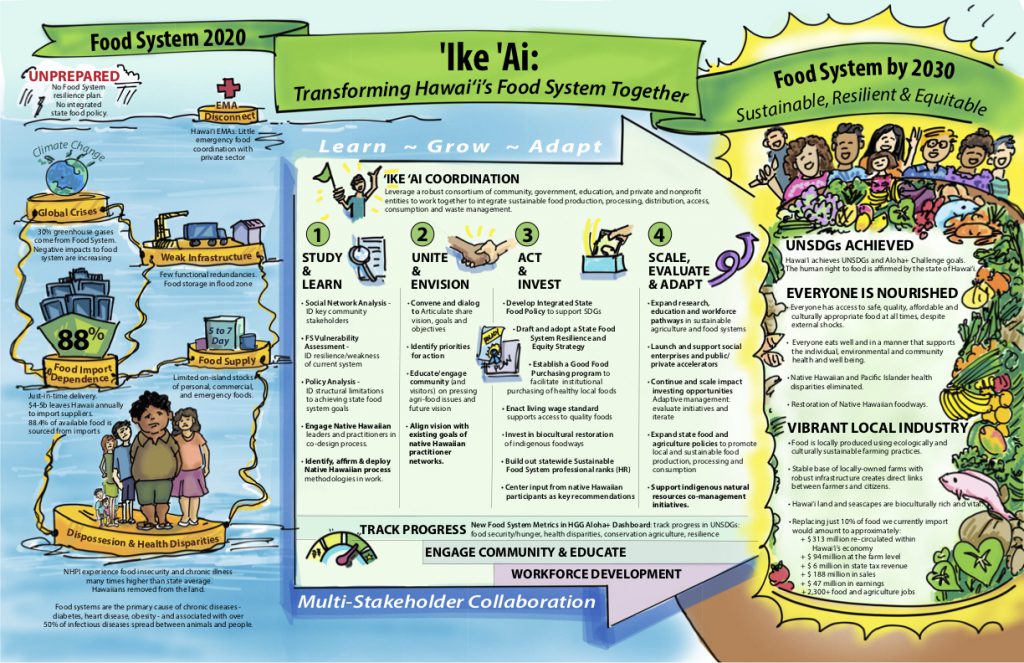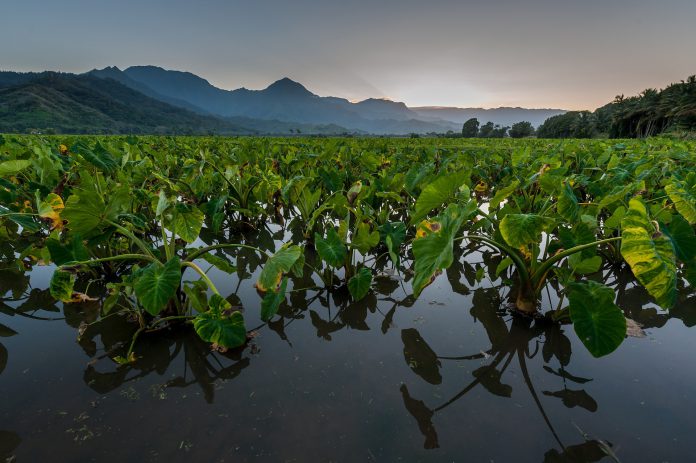A leading food systems journal recently accepted a research topic proposal by University of Hawaiʻi–West Oʻahu’s Dr. Albie Miles for a special edition in the journal, which will have international reach and provide a much-needed “state of the science” and “best practices” for food system resilience and equity planning in Hawaiʻi and beyond.
Miles’ research topic, “Achieving Food System Resilience & Equity in the Era of Global Environmental Change,” will be in a special edition of Frontiers in Sustainable Food Systems, an open-access journal that publishes rigorously peer-reviewed research on one of the biggest challenges of our time: sustainably achieving global food security.
“ ‘Frontiers’ is the leading international and multidisciplinary food systems journal dedicated to advancing science, knowledge, and practice toward achieving greater ecological sustainability in social equity in global food systems,” said Miles, commenting on the significance of his proposal’s acceptance by the journal.
His research topic addresses the question: What impact does global environmental change have on achieving ecologically sustainable, resilient, and socially equitable food systems?
On the official launch page for the special edition, the research topic is described in more detail:
The agri-food system is the primary driver of global environmental change and human health. How food and agricultural systems are designed, structured, and managed will have a profound influence on the ability of our global society to sustain globally important ecosystems services, mitigate and adapt to anthropogenic climate forcing, respond to economic and public health crises, and ensure food security, human health, and social stability into the future.
The objective of this Research Topic is to provide academics, elected officials, government agencies, urban and regional planners, community leaders, and other food system practitioners with an up-to-date scientific analysis of the systemic risks of anthropogenic climate destabilization and other stochastic shocks to agriculture, food security, human health, and economies while providing key principles, case studies and actionable strategies for achieving food system resilience and equity.
A collaborative effort
Frontiers Research Topic Editor Miles, who is an assistant professor of Sustainable Community Food Systems at UH West Oʻahu, is working in collaboration with co-editors Dr. Kathleen Merrigan (Arizona State University, Swette Center for Sustainable Food Systems), former Deputy Secretary of USDA during the Obama Administration, and other leading agri-food system scholars, including Dr. Noa Lincoln (UH Mānoa, College of Tropical Agriculture and Human Resources).
The other topic co-editors are Dr. Casey Hoy (Ohio State University), Dr. Valarie Blue Bird Jernigan (Oklahoma State University), Dr. Jennifer Sowerwine (University of California, Berkeley), Dr. Anja Gassner (World Agroforestry, Laguna, Philippines), Samina Raja (State University of New York), and Dr. Philip Dobie (World Agroforestry, Nairobi, Kenya).
Frontiers Research Topics unify the most influential researchers, the latest key findings, and historical advances in a popular research area, according to its website. Miles’ new research topic is now open for submissions, for those who may want contribute as an author.
“Publication date for the special edition — and the related book — will be approximately one year from now,” Miles said. “Individual articles as part of the special edition can be published immediately after the peer review process and acceptance, which may come sooner.”
Frontiers in Sustainable Food Systems is among more than 100 journals from Frontiers, a leading open access publisher and open science platform. Its journals are led and peer-reviewed by editorial boards of over 100,000 top researchers. Covering more than 600 academic disciplines, Frontiers is one of the largest and highest-cited publishers in the world.
ʻPart of a larger vision’
Miles’ work in Hawaiʻi — from years’ past and currently — relates to his Frontiers in Sustainable Food Systems project.
“This special edition follows my organization of one of the first national conferences on food system resilience at Stanford University in 2018,” he said. It “builds from the course that I teach at the university, SCFS 450: climate change, food security, resilience and equity.”
Miles is also working on a manuscript entitled, “Achieving Food System Resilience and Equity in Hawaii,” to help inform food system planning efforts here.
The article builds on prior work where, in 2019, we brought the city, county, state and federal emergency management agencies and private sector actors together to discuss the key points of vulnerability in the food system and the need for developing a strategy for achieving greater food system resilience and equity in Hawaiʻi, he said.
“All of this work is part of a larger vision of food system change in Hawaiʻi entitled, “ʻIke ʻAi,” (on which) I am collaborating with a number of local institutions, organizations, and community leaders,” Miles said.

